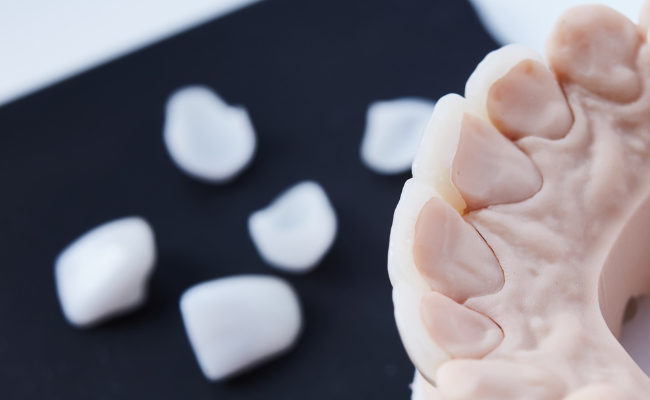Your Guide to the Cost of Veneers: What You Need to Know
The quest for beauty lies in a beautiful smile and a great set of pearly whites. But what if you don’t naturally have nice teeth? Sometimes, you need a cosmetic makeover like veneers to achieve it.
However, there is a price to pay to have a perfect set of teeth with customized veneers. Simply put, these teeth coatings are custom-made coverings or shells that fit the surface of your front teeth.
Keep in mind that they are significant teeth enhancements. Are you interested to know how much are veneers? You’ll know more about the cost, the different types, and other information as you read this article.
Cost Overview
As mentioned before, veneers are quite a considerable investment. Planning your finances carefully can help you not to overspend and still have the perfect teeth coating.
Factors That Affect the Cost of Veneers
These dental fixtures do not come cheap. Look at it as some form of cosmetic investment. Your location, the type of veneer material, and dental expertise are critical factors that affect the overall cost.
How Do Veneers and Dental Crowns Differ?
You can consider it as cosmetic dental makeup for your teeth. They beautify your teeth, making you smile more confidently. It covers cracks, chipped teeth, stains, and other imperfections.
Your dentist must shape or grind the natural tooth enamel before fitting them. Once done, the teeth’s surface becomes rough, helping keep dental veneers in place. These coating and dental crowns are quite similar but also different.
You may also like: What are veneers?
They also cover part of the tooth surface but do not strengthen your teeth. On the other hand, dental crowns cover the entire tooth and add protection to the badly damaged tooth. Both crowns and veneers typically last a long time, but you must observe proper oral care.
Types of Veneers
There are two leading types of veneer materials: porcelain and composite. They are extensively used and available in most dental clinics.
Other types, such as no-prep and removable, could suit other people’s dental needs. Here’s how each type of veneer differs:
1. Porcelain veneers
Porcelain is extensively used as a veneer material, which can last for many years. Many opt for porcelain veneers as they closely resemble natural teeth compared to composite coating.
Porcelain veneer costs are more expensive as these teeth coatings are labor-intensive, taking several days to craft in a ceramic laboratory. They have a translucent finish, similar to how natural teeth look.
2. Composite veneers
Composite types are made from composite resin, which is the same material for dental bonding. They’re cheaper than porcelain types and can also hide cosmetic flaws such as misshapen teeth, discoloration, etc. On average, composites can last between five and seven years.
3. Lumineers or No-prep veneers
Lumineers, often referred to as No-Prep veneers, are a less invasive option. The material used is called cerinate feldspathic, which is a thin layer of pressable porcelain and is less expensive.
They are custom teeth coatings but require less grinding or enamel removal. However, this type of veneer might not suit your teeth. It’s best to ask your dentist if this option is right for you.
4. Removable veneers
Removable veneers are snap-on or pop-on coating that cover your natural teeth and conceal gaps, decay, or imperfections. They are like retainers that you can remove anytime. However, putting them on can make eating and talking a little difficult. Like No-Prep veneers, ask your dentist if removable teeth coating suit you best.
Cost Comparison
How much are veneers? The cost depends on the type of veneer you choose, whether porcelain or composite. Do keep in mind that the cost is on a per-tooth basis. Here’s how each type will cost you:
- Porcelain — $500–$2,500 (per tooth)
- Composite — $250–$1,500 (per tooth)
- Removable — $300 or more (per arch)
- Lumineers — $700–$2,000 (per tooth)
Your dentist will examine the teeth that need cosmetic enhancement. They’ll also recommend how many teeth coating your teeth needs.
How to Budget for Veneers
When budgeting for veneers, consider the cost of the procedure, consultations, X-rays, and follow-up visits. Moreover, choosing a reputable dentist using quality materials is crucial.
Finding the Right Dentist
Find a dentist that specializes in cosmetic dental treatment. Generally, your dentist will give you an estimate on the veneer material and the dental procedures. The estimate may also include the cost of temporary veneers if needed.
Cost of veneers, dental expertise, state, and case complexity are key factors that affect the cost of the coating. Check this cost estimator and this link for reference.
Dentist’s Experience and Qualifications
It is important that this cosmetic procedure be carried out by a qualified dental professional. Ask the following questions when choosing a cosmetic dentist for your procedure:
- Are you a member of the American Academy of Cosmetic Dentistry?
- Did you complete a cosmetic dentistry program? Attended veneer procedure training?
- How many veneer procedures have you done, and what were the results?
- Were there complex veneer-related cases? What was the result?
- Have your dentist explain the veneer procedure in simple terms.
Payment Options for Veneers
There are several financing options available. General health insurance plans will not typically cover the cost of the veneer procedures. However, here are other financing options you can get:
Dental insurance plans: A veneer procedure can still be covered by insurance. How? Get a dental insurance. Look for emergency treatment coverage, treatment of pre-existing conditions, coverage for cosmetic dentistry, coverage for oral cancer, and hospital stay allowance.
Credit cards: You can also consider getting a loan or using your credit card for a repayment scheme.
Dental payment plans: Have an honest discussion with your dentist on payment plans. Your dentist could offer you a convenient installment plan.
Related Articles
Out-of-Pocket Expenses
On top of the veneer procedure, you’ll need dental check-ups, care, and maintenance. On average, porcelain types have 7 to 20 years of life expectancy. Here are a few tips to help you extend the life of your veneers:
- Brush and floss them.
- Avoid biting into ice and eating hard or sticky food.
- Wear a mouthguard when you play sports.
Conclusion
There is a hefty price for any cosmetic enhancement. If you are ready for dental veneers, be prepared to spend, especially if you are considering porcelain types.
Discuss with your dentist a payment plan to cover the cost. Have a thorough assessment with your dentist to check for any underlying issues such as tooth decay, and assess if your teeth are in good structure for veneer fitting.
Once you get the green light, prepare your wallet and prepare yourself for this life-changing transformation.





